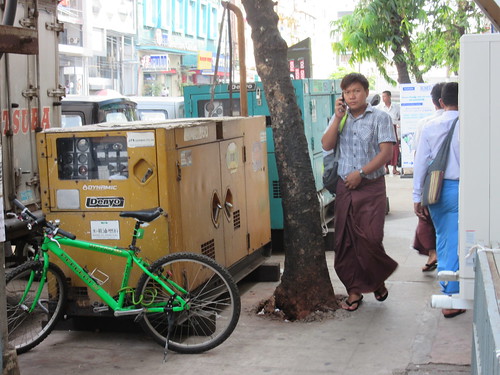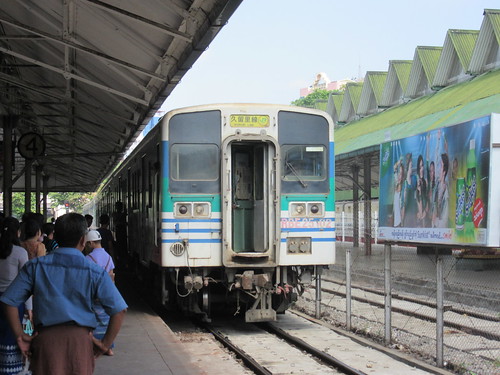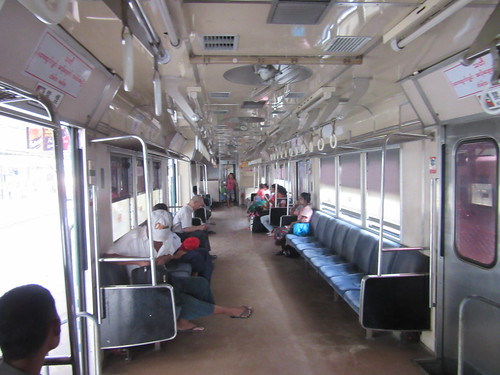According to the 'welcome' letter from the General Manager of the Strand Hotel, it was built in 1901 by John Darwood (presumably the same family also mentioned in my post Rangoon Tramways) but was subsequently acquired by the Sarkies brothers. Regarded as the "finest hostelry east of Suez" it was said to be patronised by "royalty, nobility and distinguished personages". Certainly, Rudyard Kipling (see my post Kipling's Burma), George Orwell, Somerset Maugham and Noel Coward stayed here.
I had an excellent night's sleep and took breakfast in the Strand Cafe with views of the busy Strand Road. I decided to walk to Yangon Central Station and take a trip on the fascinating 'Circular Railway'. Leaving the hotel, the first change I found within a few yards of the hotel was a covered concrete footbridge which has appeared since my last visit linking the north side of Strand Road (the hotel side) with the road to the Dalla ferry terminal. Many people who work in Yangon actually live in Dalla, the other side of the Yangon River. In 2009 I described a fascinating visit I made to Dalla in the post Ferry to Dalla. Each end of the new footbridge has both steps (for descending pedestrians) and a Schindler escalator for going up. There's a third set of steps leading to the south side of Strand road but these are not provided with an escalator. The bridge offers some new angles for photographs. A number of women were attempting to keep the bridge clean, sweeping up the dust and mopping but with the hordes of pedestrians passing in both directions it was a difficult task.
 The new footbridge across Strand Road.
The new footbridge across Strand Road.
I also noticed that the area in between the old brick transit sheds and the road to the ferry terminal is being developed but as what, I couldn't determine.
Yangon's electricity supply is still not very secure and the number of commercial premises who find it necessary to provide standby generators has increased over the years. This plant invariably provides another hazard on the already quite difficult pavements. I fondly remember some museum-ready installations with little 'Lister' engines driving a generator via a belt. Today they all seem to be 'packaged' sets of varying size and sophistication, although some of them are rather battered in the way I rather think only the Burmese can achieve.
 Standby generators mounted on the pavement in Yangon.
Standby generators mounted on the pavement in Yangon.
When I reached Yangon Central Station, I went to the 'Circle Line Tourist' booking office on platform 6/7. Once, tourists had to pay with U.S. Dollars but now they accept Kyat. A complete round trip is 1,000 Kyat (around one dollar). The hand-writing of ticket details, using a duplicate book and carbon paper, has stopped - a pre-printed paper ticket is now used which only requires two rubber stamps to validate it. Long-distance tickets are probably still manually produced. My train was to leave from platform 4, so a member of staff conducted me across two lines to the right platform (the platforms are very low so everybody always walks across the lines, although the station does have a footbridge which, with my British upbringing, I usually feel compelled to use). Assuring me that my train would arrive shortly, my guide returned to the ticket office.
When the train appeared, heading anti-clockwise, I was initially disappointed because it was one of the "new" air-conditioned diesel multiple units from Japan. But these are actually super-annuated units withdrawn from service in Japan, re-furbished and re-bogied for use in Myanmar.
 My train arriving in Yangon, still displaying its former Kururi Line markings in English and Japanese.
My train arriving in Yangon, still displaying its former Kururi Line markings in English and Japanese.
To my surprise, rather than continue anti-clockwise, we set off in a clockwise direction so, to position myself near the front, I had to walk the length of the 5-coach train. Externally, the bodysides have been sold as advertising space so the units look as gharish of some of our English trains. Internally, the original crop of Japanese signage (prohibitions, no doubt) has been re-inforced by Burmese signs. Each coach was provided with a number of oscillating fans, so I wondered if the trains really were "air-conditioned". I was puzzled because about 1 in 3 windows had been opened two or three inches whilst the remaining windows were shut.
 The comparatively luxurious accommodation of the 'new' trains.
The comparatively luxurious accommodation of the 'new' trains.
After about 75 minutes we were about halfway round the Circle Line and the train seemed to be warming up. Train staff came round opening some of the windows fully. They also opened the door to the driving cab and wedged it open with a wooden wheel scotch. Since the gangway door at the front of the cab was already open, when we were moving this produced a good current of air through the train.
I positioned myself near the open cab door for photographic purposes and, seeing my interest, I was invited into the cab and presented with one of the plastic stools to sit on with an excellent view ahead through the open gangway door. I stayed perched on my seat with a broad smile on my face (I must have looked like a sort of garden gnome) until we arrived back at Yangon Central.
Passing another 'new' diesel multiple unit.
There are two short videos showing parts of the journey. The first video shows the train on plain line and can be accessed here. The second video shows the train entering Yangon Central Station after waiting for the signal outside the station and can be accessed here. After watching either video, the 'Back Button' will return you to this post.
There was a rather surreal incident on the journey which I'll describe in the next post.
Go to next post on this trip.
All my posts describing this trip to Myanmar can be found here.
My pictures
The following albums (on Flickr) hold pictures relevant to this post:-
Strand Hotel, Yangon.
The Circle Line by DMU.
DMU Cab Ride on the Circle Line.
Around Yangon, 2015.
The Circle Line, 2015.
All the pictures for this trip (except purely 'technical' ones) can be found here.
[Text amended and pictures added 31-May-2015: Video added 14-Jul-2015: Text amended, pictures and video added 17-Jul-2015]
